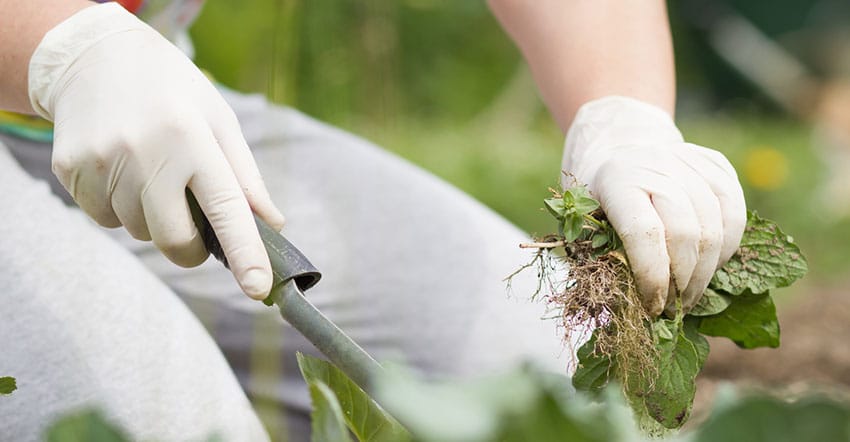How to Pull off Perfect Chemical-Free Weed Removal

Looking for easy, chemical-free weed removal? This guide’s got you covered. Here’s to a gorgeous, eco-friendly lawn!
Nobody likes the look of weeds in their garden – but we know many of you are concerned about the health effects, safety hazards, and damage to other plants that chemical weed-killing techniques can cause. That’s why we’ve created this handy guide to chemical-free weed removal!

The Chemicals Of Weed Removal – The Facts You Need To Know
According to a study published in Environmental Health News, many of the chemicals found in popular weed removal sprays contain harsh ingredients that kill human cells – especially those relating to pregnancy like embryonic, umbilical cord, and placental cells. According to National Geographic, many of these chemicals are known carcinogens (meaning they may cause cancer) and rely on genetically-modified ingredients.
While agencies like the EPA admit that they’re still not entirely certain about the long-term health effects of these chemicals, many people feel like they’ve read enough – and are ready to make the switch to chemical-free weed removal alternatives.
Alternative 1 – Get a Weed Eater
One of the most obvious ways to avoid chemicals? To look for weed-killing alternatives that don’t require them, or any other substance/spray, at all! Weed eaters are lightweight, work on a variety of terrains and sizes of gardens, and help you to get to hard-to-reach places. Plus, the process is a lot faster than chemical and sprays: instead of having to wait hours for the chemicals to “work”, you can get rid of unsightly weeds in a single afternoon with a weed eater.
As an added bonus, if you’re especially concerned about possible emissions from gas-powered weed eaters, there are also electric options to cut down on its environmental impact.
Alternative 2 – Sprinkle a Little Baking Soda
If you’ve noticed pesky weeds beginning to poke their heads up from the cracks in your sidewalks or paths, adding a little baking soda to those crevices is an easy and chemical-free weed removal solution. It’s the excess sodium found in the baking soda that does the trick in wilting the ugliest of nature’s flowers.
Alternative 3 – Use Some Salt
We’re proving that there are tons of weed removal solutions already in your kitchen! For another option, boil about 2 cups of water and 1 cup of salt. Then, take your cooking pot outside and pour it directly on the weeds. If you don’t have the time to watch water boil, you can also just sprinkle salt right onto the weeds and add a little lukewarm water (or simply wait for the next rain to wash the salt away.)
Alternative 4 – Make Use of an Old Shower Curtain
It sounds crazy, but it works – and it won’t hurt anybody. If you’re laying down gravel or mulch chips to create a path through your garden, put your shower curtain on the ground where you plan to lay the path first. Though this won’t kill the weeds, it will stop them from rearing their ugly heads up through your garden paths.
Alternative 5 – Get Out Your Vinegar
Another kitchen weed removal remedy? Use a spray bottle filled with undiluted white vinegar and spray directly onto weeds – just be careful that with this method, you’re taking care not to spray the plants themselves, as the acidity of the vinegar could harm them. As such, this method is likely best left to tackle standalone weeds.
Alternative 6 – Use Some Apple Cider Vinegar
White vinegar isn’t the only option for vinegar weed removal. Apply apple cider vinegar to weed-ridden areas by using a spray bottle, or by simply pouring straight from the bottle between the cracks of your paths and sidewalks.
Alternative 7 – Put Down Some Carpet
If you’re looking to put the unsightly living room carpet to good use, cut it into scraps, turn it face-down (carpet side down) and put it underneath straw and stone paths before laying them. It will stop weeds from spreading, and the added dark will make it harder for them to grow in the first place.
Alternative 8 – Light a Fire!
We don’t mean just torch your whole garden – though we understand that when weeds take over, it can certainly feel tempting at times. Instead, head to your local hardware or garden store, and ask about a flame-weeder tool. The heat of these tools kills the weeds instantly, and if you develop a consistent routine with your flame weeder, you’ll also killing off any surviving leaves that could start the cycle of weed growth all over again.
Please Note: If you’re living in an especially dry area, or if your area is in the midst of a drought, this may not be the safest option – use one of the other 9 listed here, instead.
Alternative 9 – Just Boil A Little Water
If you’re out of salt, or are just concerned about the effect it could have on garden slugs you might have made friends with that live near the weeds, pouring a little boiling water directly on the weed is still an effective weed removal solution.
Alternative 10 – Have a Little Vodka!
No, we’re not just talking celebrating the job-well-done on your garden. Mix about 1 ounce of vodka with a squirt of dish soap, and 2 cups of water in a spray bottle (you can just shake it up inside.) Spray your mixture on the weeds, preferably in the middle of the day so the sun activates things, and let it work its magic.
You’re a Master of Chemical-Free Weed Removal
Now that you’re armed with all these great tactics, weeds don’t stand a chance against you! There’s no reason to invest in pricey weed removal chemical sprays when there are so many solutions that are just as effective – and are already available in your kitchen or home.
If you’re looking for more tips on effective and safe weed removal, check out our buying guide or peruse through our website and blog to read reviews on cordless, gas-powered and electric weed eaters. Weed removal doesn’t have to involve the use of heavy chemicals that kill other flowers in your garden and put your pets and children at risk. We hope you’ve enjoyed this guide to chemical-free weed killing alternatives.

